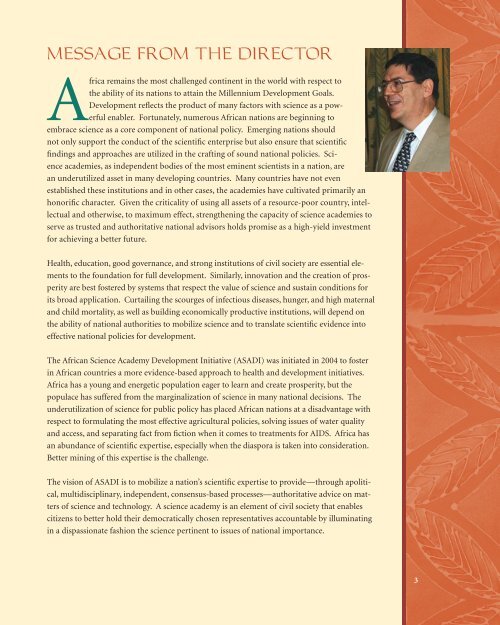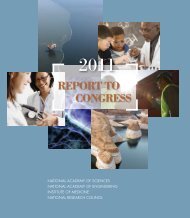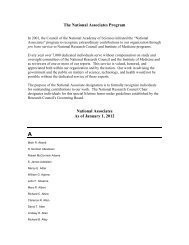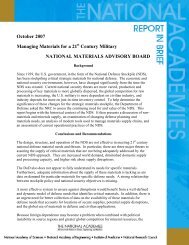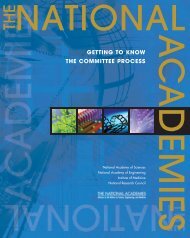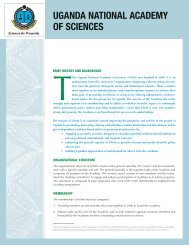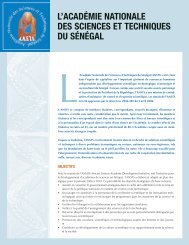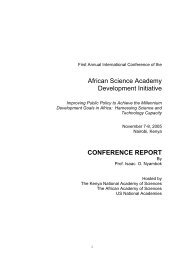Full Report (PDF 2.64 MB) - National Academies
Full Report (PDF 2.64 MB) - National Academies
Full Report (PDF 2.64 MB) - National Academies
Create successful ePaper yourself
Turn your PDF publications into a flip-book with our unique Google optimized e-Paper software.
Message from the Director<br />
Africa remains the most challenged continent in the world with respect to<br />
the ability of its nations to attain the Millennium Development Goals.<br />
Development reflects the product of many factors with science as a powerful<br />
enabler. Fortunately, numerous African nations are beginning to<br />
embrace science as a core component of national policy. Emerging nations should<br />
not only support the conduct of the scientific enterprise but also ensure that scientific<br />
findings and approaches are utilized in the crafting of sound national policies. Science<br />
academies, as independent bodies of the most eminent scientists in a nation, are<br />
an underutilized asset in many developing countries. Many countries have not even<br />
established these institutions and in other cases, the academies have cultivated primarily an<br />
honorific character. Given the criticality of using all assets of a resource-poor country, intellectual<br />
and otherwise, to maximum effect, strengthening the capacity of science academies to<br />
serve as trusted and authoritative national advisors holds promise as a high-yield investment<br />
for achieving a better future.<br />
Health, education, good governance, and strong institutions of civil society are essential elements<br />
to the foundation for full development. Similarly, innovation and the creation of prosperity<br />
are best fostered by systems that respect the value of science and sustain conditions for<br />
its broad application. Curtailing the scourges of infectious diseases, hunger, and high maternal<br />
and child mortality, as well as building economically productive institutions, will depend on<br />
the ability of national authorities to mobilize science and to translate scientific evidence into<br />
effective national policies for development.<br />
The African Science Academy Development Initiative (ASADI) was initiated in 2004 to foster<br />
in African countries a more evidence-based approach to health and development initiatives.<br />
Africa has a young and energetic population eager to learn and create prosperity, but the<br />
populace has suffered from the marginalization of science in many national decisions. The<br />
underutilization of science for public policy has placed African nations at a disadvantage with<br />
respect to formulating the most effective agricultural policies, solving issues of water quality<br />
and access, and separating fact from fiction when it comes to treatments for AIDS. Africa has<br />
an abundance of scientific expertise, especially when the diaspora is taken into consideration.<br />
Better mining of this expertise is the challenge.<br />
The vision of ASADI is to mobilize a nation’s scientific expertise to provide—through apolitical,<br />
multidisciplinary, independent, consensus-based processes—authoritative advice on matters<br />
of science and technology. A science academy is an element of civil society that enables<br />
citizens to better hold their democratically chosen representatives accountable by illuminating<br />
in a dispassionate fashion the science pertinent to issues of national importance.


